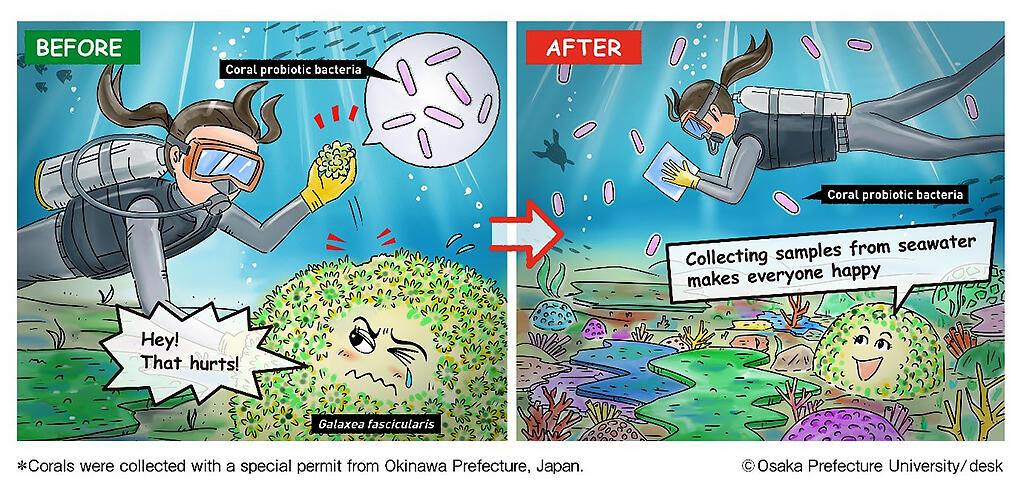Recent research has revealed that coral commensal bacteria suppress the progression of coral bleaching. Therefore, research is underway to protect corals using their commensal bacteria as a type of 'probiotics.' However, it was previously necessary to destroy corals to investigate the coral commensal bacteria.

Image provided by Osaka Prefecture University
A research group consisting of Ruriko Kitamura (completed Master's Program in 2020), Assistant Professor Natsuko Miura, and Professor Michihiko Kataoka of the Graduate School of Life and Environmental Sciences, Osaka Prefectural University; Assistant Professor Michihiro Ito and Professor Hideyuki Yamashiro of the Tropical Biosphere Research Center, University of the Ryukyus; and Assistant Professor Toshiyuki Takagi of the Atmosphere and Ocean Research Institute of the University of Tokyo has focused on the fact that the corals acquire their commensal bacteria from seawater. The researchers succeeded in specifically detecting "good" bacteria (genus Ruegeria) that are expected to suppress the growth of the "bad" bacteria (genus Vibrio) existing in the seawater around the coral reefs. Vibrio spp. are considered to be the main pathogens of corals. These findings were published online in the journal Marine Biotechnology.
The researchers noted that coral commensal bacteria were taken up from the seawater surrounding the corals. They first designed a primer for the specific detection of Ruegeria spp. The use of this primer for investigating the colonies obtained from the culture of the seawater collected from around the corals led to the successful detection of Ruegeria spp. Most importantly, it facilitated the isolation of the bacteria of interest from the seawater itself without having to destroy the corals, a major hurdle to previous research on this field.
Conducting the polymerase chain reaction (PCR) method directly on the colonies also allowed for a large number of colonies to be examined at one time, thus increasing the efficiency of obtaining bacteria of interest from seawater, compared to the use of conventional methods that first examine and identify each type of colony. In addition to this, by collecting the bacteria present in the vicinity of the corals through the filtration of the seawater around them and by performing real-time PCR on the DNA extracted from the bacteria with primers specific for the target bacteria, the researchers were able to detect the target Ruegeria spp. These findings indicate that certain bacteria can be rapidly detected in seawater.
The researchers also found, for the first time, that around the surveyed coral reefs in Okinawa, the abundance of Ruegeria spp. in the seawater fluctuated seasonally, rather than with the distance from the coral reefs. The hope is that in the future, the use of Ruegeria spp. as probiotics will provide basic techniques for the protection of endangered corals, as well as have potential applications in the monitoring of coral health.
This article has been translated by JST with permission from The Science News Ltd.(https://sci-news.co.jp/). Unauthorized reproduction of the article and photographs is prohibited.




